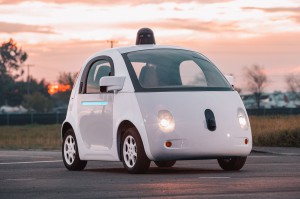History of Computers - Self-Driving Cars
Created by: Gregory Dayao
Introduction
A self-driving car, also classified as an autonomous car, is an automobile that has an autopilot system allowing to to safely navigate without the input of a human driver. The most notable self-driving car is the Google self-driving car.

Overview
After Congress allowed commercial use of self-driving cars, the state of Nevada first passed the law allowing the public operation of these cars in 2011. [1] A self driving car can navigate without human input. The car includes a guidance system to direct it to its destination along with short range sensors to navigate through traffic, pedestrians, and other cars. The laser range finders mounted on top of these autonomous cars create a 3D map of the environment. In order to have an accurate reading of position and movement, there are wheel encoders, additional to the GPS. Currently, the most popular self-driving car is the Google self-driving car. [2] The Google self-driving car is said to have over 300,000 autonomous-driving miles after its first commercial year in 2012. As of 2017, Elon Musk's TESLA company has released commercial self driving abilities to all its cars, without need of special additions. Software uses the car's preexisting sensors to allow for hands-free driving, innovating the accessibility of self-driving cars.
http://spectrum.ieee.org/image/1948541
Significance
As the introduction of self-driving cars continues, cities and communities will soon be full of self-driving cars, changing the driving experience forever. As each car is aware if its position and the position of things around it, there will be a significant decrease in the number of car accidents, increase in road capacity, and increased efficiency for transportation overall. This advanced technology uses older technologies such as GPS and sensors.
Despite the connivence of self-driving cars, there are major ethical issues preventing the rise of autonomous cars the world of laziness where humans have technology control their lives. One major issue is that who do you blame for a wreck in an autonomous car? The "driver" or the technology powering the car? Car wrecks are typically due to human error. But do you blame the technology in a Google self-driving car, universal throughout all other cars, for the wreck? In addition, despite how advanced the technology of a self-driving car is, the car is still susceptible to hacks for illegal use. Also, what will happen when everyone starts to use a self-driving car and speed limits are no longer broken? Cities make a lot of revenue off of traffic tickets and employ policemen to enforce the rules of the rode. [1] [3]
The Google self-driving car, for example, is legally allowed in California, Nevada, Utah, North Dakota, Michigan, Tennessee, Florida, and Washington D.C. as of 2016 and the list will continue to grow in the coming years.
Cites
http://www.wisegeek.com/what-is-a-driverless-car.htm
https://www.google.com/selfdrivingcar/how/
https://en.wikipedia.org/wiki/Autonomous_car
https://en.wikipedia.org/wiki/Google_self-driving_car#cite_note-Forbes0611-4